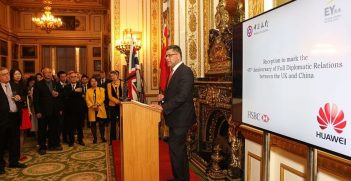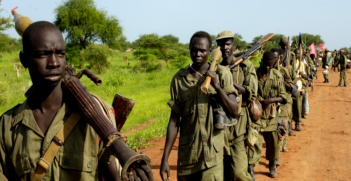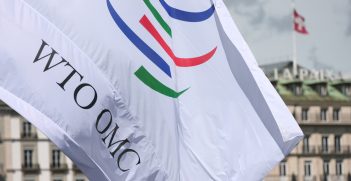Global Structural Constraints Continue to Disadvantage African Economies

COVID-19 and the Russian invasion of Ukraine have compounded the development constraints faced by African nations. But world trade, outdated debt structures, and illicit financial flows continue to challenge the long-term prospects of developing African nations.
Today’s international trade and financial systems were constructed over the last 70 years by and for the rich countries, and primarily with their needs and interests in mind. African countries have long complained that the institutions, policies, and practices of the global trade and financial architecture put them at a structural disadvantage in the global economy, and pose substantial constraints to their long-term national economic development.
One major constraint faced by African countries is the loss of “policy space” in international trade agreements and investment treaties. Historically, many of today’s advanced economies had used policies such as trade protection, subsidies, subsidised commercial credit, preferential tax policies, rules of entry on foreign investors, and a range of other policies to help build up their domestic manufacturing industries over time. However, since 1995, the membership rules of the World Trade Organization (WTO) have called for reductions in the use of such policies. In addition, African countries have also ratified hundreds of bilateral and regional free trade agreements (FTAs) and bilateral investment treaties (BITs) that have gone even further than WTO rules in restricting the use of various industrial policies. This has made it much more difficult for African governments to proactively support the development of their domestic manufacturing sectors over time.
A second major constraint is more generally reflected in the way we have thought about development in recent decades. Beginning with the era of globalisation and free markets in the 1980s, African countries were advised by the World Bank and other major bilateral and multilateral foreign aid donors to adopt free market policies and to integrate into the global economy as they were – largely still primary commodity exporters – and to set aside aspirations for using industrial policies for long-term structural transformation. This meant rejecting the pathway of development many advanced Western states had accepted to pursue their own national economic development – to be followed later by their gradual integration into the international economy. But this contemporary development model has not seen much success. The broad based failure of this approach is reflected in the recent research by United Nations Conference on Trade and Development titled “State of Commodity Dependence Report 2021,” which lists the number of developing countries classified as commodity dependent, namely where commodity export earnings account for more than 60 percent of total merchandise export value. In 2019, it found that nearly two thirds of all developing countries were still commodity dependent, up from 93 in 2009. In Africa, most of the 54 countries in the region remain classified as commodity dependent, increasing from 40 in 2009 to 45 in 2019.
A third major constraint faced by African economies is the lack of an international sovereign debt workout mechanism. Under the current system, whenever an African economy faces a sovereign debt crisis and begins to default on its external creditors, it must try to renegotiate its debt payments with hundreds of different creditors at the same time. Some are willing to take a loss and restructure debt payments, but others act as holdouts and refuse to negotiate, often leading to years of international litigation. This disorderly process can prevent economies from recovering more quickly and reestablishing new credit ratings. In extreme cases, sovereign debt defaults can lead to financial crises that could spread across the region and potentially ignite an international financial crisis as we saw in East Asia in the late 1990s.
Today, many African countries have been hit with multiple challenges compounded further by COVID-19 economic shutdowns, increased health expenditures, and imported inflation from global supply chain bottlenecks resulting further from Russia’s invasion of Ukraine. Several African countries are increasingly at risk of sovereign debt default, including Ghana, Kenya, Zambia, South Africa, Guinea Bissau, Eritrea, Ghana, Togo, Sierra Leone, Gabon, Congo, Angola, and Mozambique. Yet, the global financial architecture still lacks anything like an international sovereign debt workout mechanism. In 2020, advanced economies established a limited facility for temporary debt relief for some countries, and the G20 established the Debt Service Suspension Initiative (DSSI), which expired at the end of 2021. However, the DSSI did not include restructuring among the world’s growing number of private creditors, making both initiatives insufficient. The only solution is for the international community to establish an international sovereign debt workout mechanism that sets agreed rules for orderly, predictable, transparent, and equitable sovereign debt restructurings and that include and apply to all major public and private creditors.
A fourth global structural constraint faced by African economies are the related problems of illicit financial flows (IFFs), capital flight, and tax evasion. IFFs include resources that originate from criminal activities – drug dealing or human trafficking for instance – as well as international transfers of income and profits legally generated but illicitly transferred abroad to avoid or evade taxes. It is estimated that illicit tax and commercial practices by multinational corporations (MNCs) and wealthy individuals account for up to two thirds of total global IFFs annually, costing hundreds of billions per year in lost tax revenues.
Common mechanisms for tax evasion include the use of anonymous shell companies and trusts to hide the identity of the actual company owners, and establishing such shell companies in the world’s growing network of offshore centres and tax havens known as “secrecy jurisdictions.” The Tax Justice Network’s annual report, “The State of Tax Justice 2021,” estimates that countries are losing $483 billion in tax per year to global tax abuse committed by MNCs and wealthy individuals. For Africa, one estimate is that its countries have lost nearly $1 trillion over the last five decades, facilitated by offshore centres and tax havens that enable tax avoidance and evasion. This means much more money has been flowing out of Africa each year in IFFs than into Africa, making the continent a net creditor to the world.
But recently there has been a growing recognition of the problem. For example tax authorities and national governments are increasingly establishing due diligence regulatory requirements on their financial services firms that typically function as “enablers” of IFFs, including banks, tax accountancies, law firms, auditors, real estate brokers, and other financial services. Increasingly, new due diligence rules require such services to first know the actual owners of the companies they are working with and the sources of their assets, and in some cases, to share this information with national tax authorities and law enforcement. While these developments are important, much more needs to be done to stop the loss of billions of dollars in tax revenues from African economies each year.
Other global constraints include the systems which prevent African countries from borrowing in their own currencies, requiring them to export more commodities to earn the foreign exchange with which to repay external debts; the related fact that African economies cannot use their own currencies to pay for needed imports; the need for an improved “lender of last resort” that does not include the International Monetary Fund’s (IMF) onerous loan conditions; the need for major governance reforms at the IMF and World Bank that can give African economies more voice in lending decisions; and last but not least, the insufficient levels of foreign aid needed to address development and climate change. As with the other constraints mentioned above, the international community needs to undertake major reforms of the global trade and finance systems that can meaningfully help African and other developing economies.
Rick Rowden teaches international economics and development in the School of International Service at American University in Washington DC.
This article is published under a Creative Commons Licence and may be republished with attribution.





